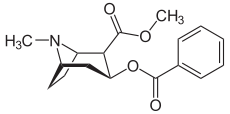- Cocaine intoxication
-
Cocaine intoxication Classification and external resources 
CocaineICD-10 F14.0 ICD-9 305.6 eMedicine article/813959 MeSH D019970 Cocaine intoxication refers to the immediate effects of cocaine on the body. Although cocaine intoxication and cocaine dependence can be present in the same individual, they present with different sets of symptoms.
With excessive or prolonged use, the drug can cause itching, tachycardia, hallucinations, and paranoid delusions. Overdoses cause tachyarrhythmias and a marked elevation of blood pressure, which can be life-threatening. The LD50 of cocaine when administered intraperitoneally to mice is 95.1 mg/kg,[1], whereas the LD50 when administered intravenously in rats is 10 mg/kg.[2] Toxicity results in seizures, followed by respiratory and circulatory depression of medullar origin. This may lead to death from respiratory failure, stroke, cerebral hemorrhage, or heart-failure. Cocaine is also highly pyrogenic, because the stimulation and increased muscular activity cause greater heat production. Heat loss is inhibited by the intense vasoconstriction. Cocaine-induced hyperthermia may cause muscle cell destruction and myoglobinuria resulting in renal failure. Emergency treatment often consists of administering a benzodiazepine sedation agent, such as diazepam (Valium) to decrease the elevated heart rate and blood pressure. Physical cooling (ice, cold blankets, etc...) and paracetamol (acetaminophen) may be used to treat hyperthermia, while specific treatments are then developed for any further complications. There is no officially approved specific antidote for cocaine overdose, and although some drugs such as dexmedetomidine and rimcazole have been found to be useful for treating cocaine overdose in animal studies, no formal human trials have been carried out.[citation needed] In addition, a history of high blood pressure or cardiac problems puts the patient at high risk of cardiac arrest or stroke, and requires immediate medical treatment.
Cocaine's primary acute effect on brain chemistry is to raise the amount of dopamine and serotonin in the nucleus accumbens (the pleasure center in the brain); this effect ceases, due to metabolism of cocaine to inactive compounds and particularly due to the depletion of the transmitter resources (tachyphylaxis). This can be experienced acutely as feelings of depression, as a "crash" after the initial high. Further mechanisms occur in chronic cocaine use.
Studies have shown that cocaine usage during pregnancy triggers premature labor[3] and may lead to abruptio placentae.[4]
References
- ^ Bedford JA, Turner CE, Elsohly HN (1982). "Comparative lethality of coca and cocaine". Pharmacol. Biochem. Behav. 17 (5): 1087–8. doi:10.1016/0091-3057(82)90499-3. PMID 7178201.
- ^ Booze RM, Lehner AF, Wallace DR, Welch MA, Mactutus CF (1997). "Dose-response Cocaine Pharmacokinetics and Metabolic Profile Following Intravenous Administration and Arterial Sampling in Unanesthetized, Freely Moving Male Rats". Neurotoxicol Teratol 19 (1): 7–15. PMID 9088006.
- ^ "Cocaine triggers premature labor". USA Today (Society for the Advancement of Education). 1993. http://findarticles.com/p/articles/mi_m1272/is_n2581_v122/ai_14236195.
- ^ Flowers D, Clark JF, Westney LS (1991). "Cocaine intoxication associated with abruptio placentae". J Natl Med Assoc 83 (3): 230–2. PMC 2627035. PMID 2038082. http://www.pubmedcentral.nih.gov/articlerender.fcgi?tool=pmcentrez&artid=2627035.
Psychoactive substance-related disorder (F10–F19, 291–292; 303–305) General Alcohol Opioids Cannabis SID (Short-term effects of cannabis, Cannabis withdrawal) · SUD (Cannabis dependence)Sedative/hypnotic benzodiazepine: SID (Benzodiazepine overdose, Benzodiazepine withdrawal) · SUD (Benzodiazepine drug misuse, Benzodiazepine dependence)barbiturate: SID (Barbiturate overdose) · SUD (Barbiturate dependence)Cocaine SID (Cocaine intoxication) · SUD (Cocaine dependence)Stimulants SID (Stimulant psychosis) · SUD (Amphetamine dependence) · Health effects of caffeine (Caffeine-induced sleep disorder)Hallucinogen Tobacco Volatile solvents Inhalant abuse: Toluene toxicityMultiple Categories:
Wikimedia Foundation. 2010.
